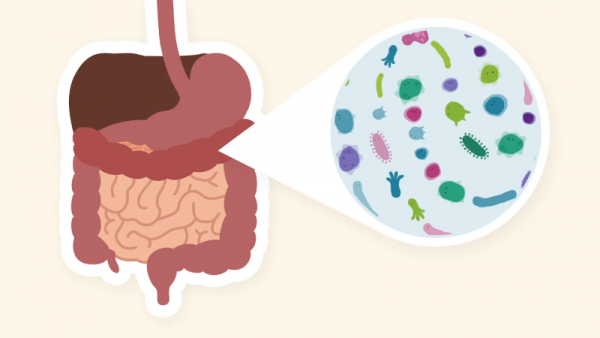By KM Diaz, | May 01, 2017

Gut microbes work like a small metabolic factory to convert the food of their host into a new chemical. (YouTube)
Neuroscientists have discovered the role of gut microbes in their animal host, they help the brain to decide what to eat and detect what nutrient is missing in foods.
Gut microbes are known to influence diet, depression, anxiety, and hypertension. However, the role of these trillions of tiny guests residing in the digestive tract of humans, animals, and other insects remain a mystery.
Like Us on Facebook
Now, neuroscientists have found out how particular types of gut flora help their animal host to distinguish what to eat and how much nutrient is missing in foods. The microbes will titrate some nutrients needed from the food to give the exact amount from its host.
Carlos Ribeiro, the senior author of the study from Champalimaud Center for the Unknown in Lisbon, studied the eating behaviors of a fruit fly - Drosophila melanogaster. Ribeiro and his research team showed the influence of gut microbes in the nutritional decisions of the fruit fly. The study was published in PLoS Biology.
The team fed the first group of flies with a sucrose solution with all of the important amino acids. The second group received a mixture of some of the amino acids to make proteins. For the third group, the researchers removed all of the important amino acids one by one to identify which nutrients are being recognized by gut microbes.
The three groups were presented in a buffet with protein-rich yeast alongside normal sugary solution after 72 hours. The researchers observed that the two groups lacked which essential amino acid craved for the yeast to make up for the missing nutrients.
Furthermore, when researchers combined the five different types of bacteria in the digestive tract of flies in the food - Enterococcus faecalis, Acetobacter pomorum, Commensalibacter intestini, Lactobacillus plantarum, L. brevis - all of them lost their urge to eat more.
Gut microbes work like a small metabolic factory to convert the food of their host into a new chemical. The two specific bacteria that influence the appetite of flies are Lactobacillus and Acetobacter.
For the next step, the research team removed an enzyme which is essential to process the amino acid tyrosine in flies. Through this, the flies need to get tyrosine by their food. In their findings, Lactobacillus and Acetobacter were not capable of suppressing the cravings for tyrosine in the modified flies. Ribeiro explains that gut microbes evolved to titrate only the important amino acid intake.
However, the research did not determine the mechanism of communication, but Ribeiro assumes that microbes have their own way to communicate with the brain. The study also used animal models, although Ribeiro believes that gut-brain communication may provide treatments for humans in the future.
-
Use of Coronavirus Pandemic Drones Raises Privacy Concerns: Drones Spread Fear, Local Officials Say

-
Coronavirus Hampers The Delivery Of Lockheed Martin F-35 Stealth Fighters For 2020

-
Instagram Speeds Up Plans to Add Account Memorialization Feature Due to COVID-19 Deaths

-
NASA: Perseverance Plans to Bring 'Mars Rock' to Earth in 2031

-
600 Dead And 3,000 In The Hospital as Iranians Believed Drinking High-Concentrations of Alcohol Can Cure The Coronavirus

-
600 Dead And 3,000 In The Hospital as Iranians Believed Drinking High-Concentrations of Alcohol Can Cure The Coronavirus

-
COVID-19: Doctors, Nurses Use Virtual Reality to Learn New Skills in Treating Coronavirus Patients











